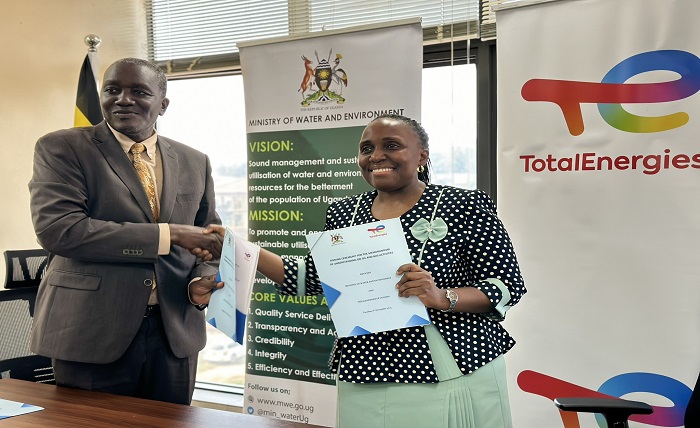
HABARI DAILY I Kampala, Uganda I TotalEnergies EP Uganda (TEPU) has signed a five-year memorandum of understanding (MoU) with the Ministry of Water and Environment (MWE) to conserve and restore wetlands and riparian vegetation within the Tilenga Project area.
The five-year commitment marks the beginning of a partnership to develop and implement various activities in collaboration with different partners all designed to help conserve and restore wetlands in the Albertine Rift region.
Speaking at the signing of the MoU, at the MWE headquarters in Luzira, Kampala, Mrs. Mariam Nampeera Mbowa, the Deputy General Manager, TotalEnergies EP Uganda said “Conserving the rich biodiversity of the Albertine Region is an integral part of the Tilenga Project and we are committed to the achieving positive outcomes for biodiversity and host communities.
ECOLOGICAL IMPORTANCE
She said wetland ecosystems represent important habitat for both flora and fauna species, and that they play an important role in moderating local and regional climate, purifying water and maintaining water tables.
“The wetlands of the River Nile and Lake Albert are of great ecological importance for fish, birds and other wildlife and are as well essential for maintaining water balance and quality,” she said, adding: “This initiative will therefore focus on working in partnership with the Ministry of Water and Environment and host communities to help restore degraded wetland areas, improve freshwater quality, and promote the principles of wise use.”
WETLAND RESTORATION
The MoU will guide the collaboration and joint initiatives between TEPU and MWE which include development of wetland management plans; engaging with host communities, wetland user education and awareness; demarcation and restoration; and water quality monitoring.
Mr. Alfred Okot Okidi, the Permanent Secretary, MWE said wetlands are the most vulnerable ecosystems and also the quickest in recovery when restoration is undertaken well.
“Wetland restoration results can be achieved in under 12 months compared to forest restoration.”
Communities are part of the solution primarily to solve the problem and also in ensuring restoration efforts are sustained.
Mr. Okidi said development must occur but in a sustainable manner and at some point, we may need to undertake a tradeoff which will be a delicate balance to achieve.
“This is primarily to ensure that the interest of policy makers, communities and developers are aligned and also achieved.”

The Tilenga Biodiversity program targets securing important remaining wetland areas and through restoration of 500 hectares of degraded wetlands along Lake Albert, on the north-western side of the escarpment. in addition to improving freshwater quality.
AFRICA’S BIODIVERSITY
TotalEnergies EP Uganda is implementing the Tilenga project in the Albertine Rift Valley, one of Africa’s most significant areas for biodiversity.
To this end, the company is collaborating with various state and non-state mandated institutions, conservation organisations, and communities in the Tilenga project area to implement the Tilenga Biodiversity Program.
Through this program, the company aims to conserve forests, rangelands, and wetlands in Uganda, restore the Bugoma-Budongo forest corridor, reduce human pressures on the Murchison Falls and Bugungu protected areas, restore wetlands on the shores of Lake Albert and the Albert Delta Ramsar site
It also provides environment sensitization to communities in these areas. These strategies are part of a global plan which consist of reducing human pressure, protecting the integrity and the connectivity of savanna habitats
Whereas TotalEnergies has been present in Uganda since 1955 through its marketing operations and has more 200 stations countrywide, TotalEnergies EP Uganda is an upstream affiliate which is leading the development activities towards production in the Tilenga project area – Contract Area 1 (CA-1) and Licence Area 2 North (LA-2N) within the Albertine region




